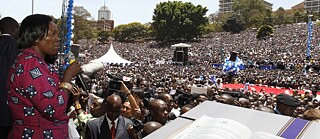Frankly ... integrated
Are we ready for female leadership?

Germany has had a female chancellor since 2005. But with imbalances persisting in the society, author Dominic Otiang’a poses the question: Is Germany as ready for another female political leader as it seems at first glance?
By Dominic Otiang’a
While watching an interview of the German Chancellor Angela Merkel with four friends, one of us wondered how it feels to be the most powerful person in Europe. Another one expressed how powerless she was since all the sixteen leaders of the federal states had to participate in important decision-making processes. But a third person turned to me to ask: “Do you think people in your home country are ready to elect a woman as president?” It is possible that we were looking at the same screen and saw different things, like the scripture that reflected our subjective views and values.
I had no immediate answer – not that there was none – but while I was mulling over a lot of different things, I thought about why the question was even asked, while at the same time mentally going through the political landscape in my home country: the women in politics, political systems, and comparing all that to Germany. “Well, I can understand, it was the same here decades ago,” my friend responded to my silence.
While men are in charge
I was still hoping to find a response to the question, even a few years later. It was this question that forced me to think about gender and professions. And when I walked to the city council office in Stuttgart and saw only women in the expansive working space, I remembered to ask one of them: “So, where are the men?” She said that the only man in the team was on leave. However, she added that the situation has been the same during her training, with just a few or no men present. Surprisingly to me, the boss was a man. I could see his jacket hanging at a door, while his shoes tapped on the floor in excitement or stress.Also, when I went to the bank, the front desk employees were all female. A man in a suit was behind a transparent wall in a different room, and the lady attending to me had to walk back and forth between me and him until my issue was sorted. Days later, I followed a discussion on TV on why some women get paid less than men for the same job. Meanwhile, I still had the question in mind: “Is your home country ready for a female head of state?”
Rough political terrain
Now that the Green party has fronted a female candidate in Germany, there is a chance that Germany might have a second female chancellor. Is the country ready for it? And does it have to do anything with readiness or is it about what system of governance allows the public to focus more on the party's ideas than on the politician?While looking at a young politician from the CDU party on TV and seeing him speak, debate, and present himself, hearing a news presenter say that he is the future of the conservative party (CDU), I find it interesting to imagine his persona and career in a presidential constitutional republic. He is polite, articulate and serious, but nevertheless, I was convinced that he would be beaten politically by the conscientious women and men that I have seen in different African countries, Brazil and the USA, where the political terrain is rough and tough, and the persona matters more than the political party. In these places he would be required to move a crowd with charm and euphoria, spreading a message of hope or using empty rhetoric. In these places where, in order to succeed, he ought to withstand insults and fend off unnecessary accusations like: “he is not fit to sit on a public toilet, let alone in a public office”, agreeableness as a personality trait is almost a guaranteed disadvantage.
Now that the Green party has decided to nominate Annalena Baerbock as candidate for the chancellorship, the parliamentary system of government demonstrates how it helps to avoid the described smear campaigns. Parties decide on a candidate and voters elect the party based on the values and goals it stands for. This way, the question as to whether voters are ready for a man, or a woman does not apply. For that reason, a politician of any gender or from any group – majority or minority – would stand a chance provided their parties fronted them. In presidential constitutional republics like the USA, Brazil and Kenya, candidates of parties have drawn-out campaign trails full of intrigues, insults and euphoria. The men and women who thrive in such systems have probably their personalities to thank for their success, more than their political parties.
To finally answer the question, the people in my home country have elected female representatives before – in the countryside and in major towns. Yes, they are ready for a female president, too! However, a parliamentary system of governance would make it easier as it gives the political party the power to nominate a female candidate.
“Frankly ...”
On an alternating basis each week, our “Frankly …” column series is written by Dominic Otiang’a, Aya Jaff, Maximilian Buddenbohm and Margarita Tsomou. Dominic Otiang'a writes about his life in Germany: what strikes him, what is strange, where did he get interesting insights?